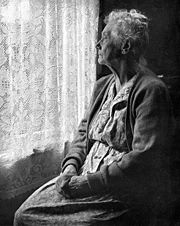
Disengagement theory
Encyclopedia

Ageing
Ageing or aging is the accumulation of changes in a person over time. Ageing in humans refers to a multidimensional process of physical, psychological, and social change. Some dimensions of ageing grow and expand over time, while others decline...
states that "aging is an inevitable, mutual withdrawal or disengagement, resulting in decreased interaction between the aging person and others in the social system he belongs to". The theory claims that it is natural and acceptable for older adults to withdraw from society. The theory was formulated by Cumming and Henry in 1961 in the book Growing Old, and it was the first theory of aging that social scientists
Social sciences
Social science is the field of study concerned with society. "Social science" is commonly used as an umbrella term to refer to a plurality of fields outside of the natural sciences usually exclusive of the administrative or managerial sciences...
developed. Thus, this theory has historical significance in gerontology
Gerontology
Gerontology is the study of the social, psychological and biological aspects of aging...
. Since then, it has faced strong criticism since the theory was proposed as innate, universal
Cultural universal
A cultural universal , as discussed by George Murdock, Claude Lévi-Strauss, Donald Brown and others, is an element, pattern, trait, or institution that is common to all human cultures worldwide. Taken together, the whole body of cultural universals is known as the human condition...
, and unidirectional.
The disengagement theory is one of three major psychosocial theories which describe how people develop in old age. The other two major psychosocial theories are the activity theory
Activity theory (aging)
The activity theory, also known as the implicit theory of aging, normal theory of aging, and lay theory of aging, proposes that successful aging occurs when older adults stay active and maintain social interactions....
and the continuity theory, and the disengagement theory comes to odds with both.
Postulates
Cumming and Henry provided the following nine postulates for the "process of disengagement":- Postulate 1: Everyone expects death, and one's abilities will likely deteriorate over time. As a result, every person will lose ties to others in his or her society.
- Postulate 2: Because individual interactions between people strengthen norms, an individual who has fewer varieties of interactions has greater freedom from the norms imposed by interaction. Consequently, this form of disengagement becomes a circular or self-perpetuating process.
- Postulate 3: Because men have a centrally instrumental role in America, and women a socioemotional one, disengagement differs between men and women.
- Postulate 4: The individual's life is punctuated by ego changes. For example, aging, a form of ego change, causes knowledge and skill to deteriorate. However, success in an industrialized society demands certain knowledge and skill. To satisfy these demands, age-grading ensures that the young possess sufficient knowledge and skill to assume authority and the old retire before they lose their skills. This kind of disengagement is effected by the individual, prompted by either ego changes or the organisation—which is bound to organisational imperatives—or both.
- Postulate 5: When both the individual and society are ready for disengagement, complete disengagement results. When neither is ready, continuing engagement results. When the individual is ready and society is not, a disjunction between the expectations of the individual and of the members of this social systems results, but engagement usually continues. When society is ready and the indidviual is not, the result of the disjunction is usually disengagement.
- Postulate 6: Man's central role is work, and woman's is marriage and family. If individuals abandon their central roles, they drastically lose social life space, and so suffer crisis and demoralisation unless they assume the different roles required by the disengaged state.
- Postulate 7: This postulate contains two main concepts.
- (a) Readiness for disengagement occurs if:
- An individual is aware of the shortness of life and scarcity of time.
- Individuals perceive their life space decreasing.
- A person loses ego energy.
- (b) Each level of society grants individuals permission to disengage because of the following:
- Requirements of the rational-legal occupational system in an affluent society
- The nature of the nuclear family
- The differential death rate
- (a) Readiness for disengagement occurs if:
- Postulate 8: Fewer interactions and disengagement from central roles lead to the relationships in the remaining roles changing. In turn, relational rewards become more diverse, and vertical solidarities are transformed to horizontal ones.
- Postulate 9: Disengagement theory is independent of culture, but the form it takes is bound by culture.
See also
- Aging
- Activity theory (aging)Activity theory (aging)The activity theory, also known as the implicit theory of aging, normal theory of aging, and lay theory of aging, proposes that successful aging occurs when older adults stay active and maintain social interactions....
- Continuity theory (aging)

